Newton-Wellesley
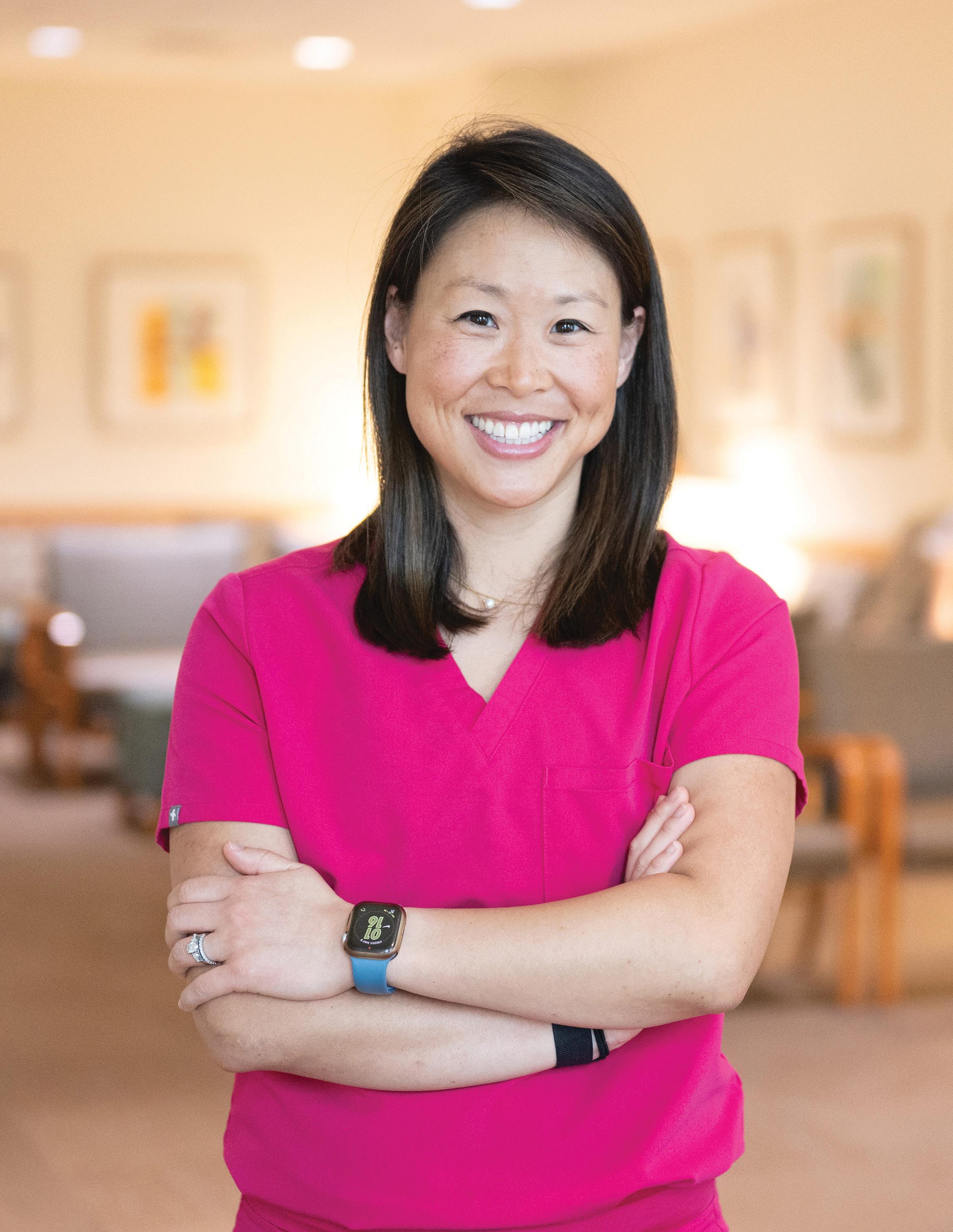
The future of orthopedics
The gift of palliative care
Nurturing children’s mental health
“Everyone wants to thrive in life. The joy of my practice is making sure that you are the best version of yourself.”
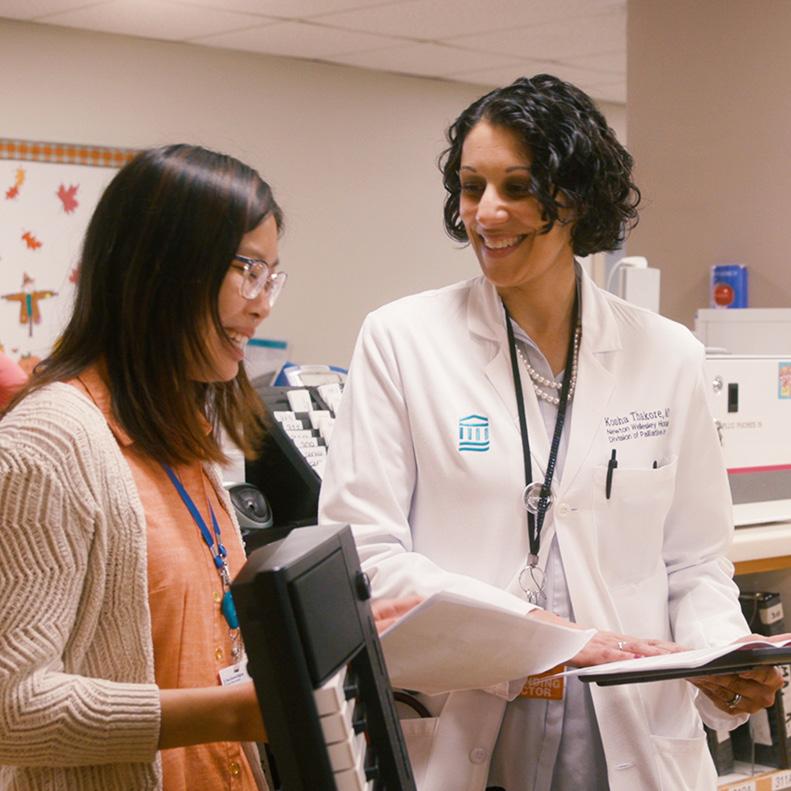
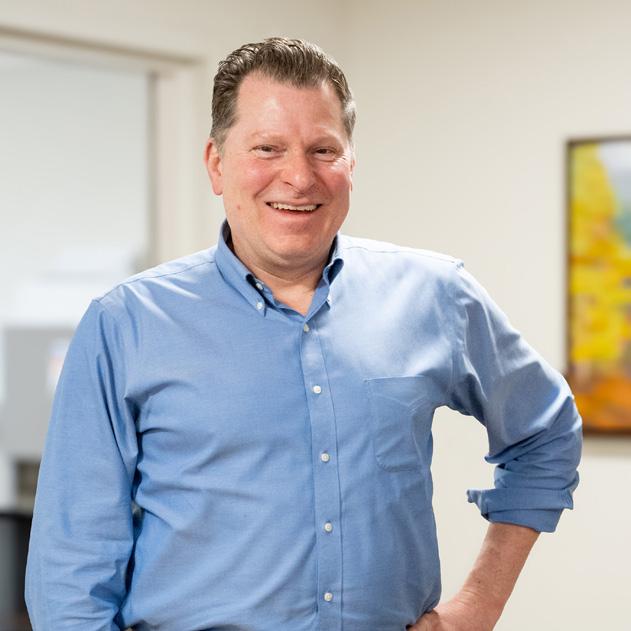
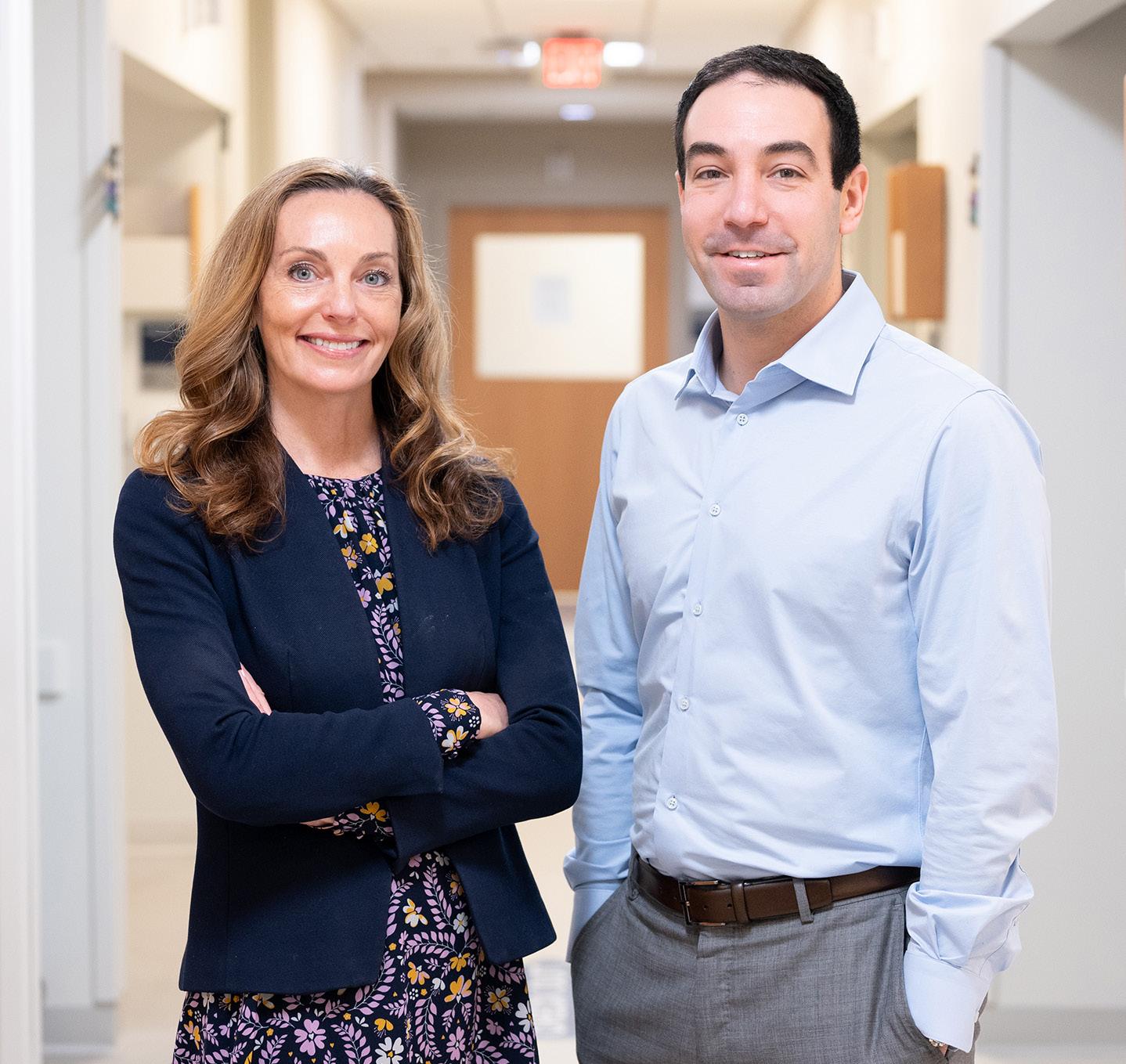


The future of orthopedics
The gift of palliative care
Nurturing children’s mental health
“Everyone wants to thrive in life. The joy of my practice is making sure that you are the best version of yourself.”



For the field of orthopedics, so many exciting advances are on the horizon. NWH strives to stay on the cutting edge, empowering patients to embrace life to the fullest.
On any given fall weekend, you’ll likely find Timothy Foster, MD, MBA, MS, patrolling the sidelines of a Boston College football game with his Sports Medicine colleagues from Newton-Wellesley.
NWH’s visionary chair of orthopedic surgery first dreamed of a future in medicine as a college athlete himself. Early on, “the ability to change people’s lives drew me towards orthopedics,” he reflects.
In a field shaped by constant progress, innovations have profoundly improved patient outcomes and experiences. Our orthopedic specialists are continually seeking—and finding—ways to make healing happen more quickly, thanks to advanced surgical techniques and the use of new therapies.
Following Dr. Foster’s lead, they’re keeping their eyes on the future—including what the exciting new Center for Bone and Joint Preservation will mean for our patients’ lives. (See plans, pages 8-9.)
When it comes to orthopedic issues, getting the right care at the right time can lead to swift relief and a trajectory of lifelong health and wellness.
From the best in regional spine care to outpatient joint replacements to game-changing sports medicine, our specialists are committed to providing world-class care
8,057 Joint Center patient visits in 2024
66,340 Orthopedics outpatient visits in 2024
close to home. Together, “we aim to restore mobility, strength, and hope to every patient who comes through our doors,” Dr. Foster reflects.
Since 2012, when a national search led to him becoming the department’s inaugural chair, demand for NWH’s services has grown dramatically. Today, “we’re seeing more patients than ever before,” he notes. Along with a surge in outpatient visits, the volume of orthopedic surgeries has more than doubled in the past decade.
“I have to give thanks to the entire team,” he adds gratefully. “We are a team of teams. And the leaders of those teams are just incredible.”
Speaking of teams, Dr. Foster sees the Mass General Brigham partnership with Boston College athletics as a point of pride. NWH Sports Medicine provides team physicians for all of BC’s 31 varsity teams.
“While that helps to drive us, part of sports medicine is taking care of the weekend warriors as well,” he adds. Personally, “I just love helping people get back to the things they love to do, and it can be anybody from a varsity football player to an octogenarian who’s playing pickleball.”
Athletes of all ages, pursuits, and levels turn to NewtonWellesley for expert care. “All of that is sports medicine,” Dr. Foster emphasizes.
175% Increase in orthopedic surgical volume since 2020
8,189
Total orthopedic surgeries in 2024

“We aim to restore mobility, strength, and hope to every patient who comes through our doors.”
Timothy Foster, MD, MBA, MS

“I’m excited to see how new breakthroughs change even more lives for the better.”
Jessica Aidlen, MD
As a field, “it’s ever-changing,” reflects Robert Nascimento, MD, chief, Sports Medicine. Since joining our hospital staff a decade ago, he’s seen an ongoing evolution in treatment options.
“We want people to stay active,” he says. “Whatever it is you play, we’ll help keep you playing longer.”
Advances in spine care
“Everyone wants to thrive in life,” reflects Jessica Aidlen, MD, chief, Spine Surgery. “The joy of my practice is making sure that you are the best version of yourself.”
She points to an explosion of enabling technologies as helping her team at the NWH Spine Center to achieve that. “The way that I treat my patients today is very different from even five years ago,” she says. “I’m excited to see how new breakthroughs change even more lives for the better.”
In her work as a surgeon, she’s been at the forefront of advances from robotics and navigation systems to endoscopic surgery to motion preservation. “Yet only a very small percentage of people who come through the Spine Center end up having spine surgery,” she explains.
Through the center’s unique multidisciplinary approach, “you’ll find the care you need all under one roof.” The expert team includes not only spine surgeons but also physical and occupational therapists, physiatrists, pain management specialists, and more—plus navigators to guide you.
“Everyone at the end of the day is an athlete,” she believes. “Whether you want to play high school sports or you want to take walks with your grandkids, people want to maintain activity.”
Exceeding expectations at Ortho Walk-In
From day one, the Orthopedic Walk-In has inspired patients to spread the word. It’s become a go-to resource for entire families. “I don’t know what we’d do without it,” says one parent.



“Teamwork comes naturally. Our collaborative nature helps us be the very best for the patient.”
Christina Kim, MD

When the clinic first opened at 978 Worcester Street in Wellesley in 2021, it was one of only a few such centers in the United States. In charting its course, “we were looking at patients’ needs from a community point of view, with the goal of streamlined access to expert orthopedic care,” says medical director Jason Simon, MD.
While they hoped to see 1,000 patients in the first year, they ended up seeing 4,000. “Every year since then we’ve nearly doubled the volume,” Dr. Foster adds. On average, the highly trained physician assistants have patients in and out in 64 minutes—and connect them to orthopedic surgeons if needed.
Its success has spurred Mass General Brigham to seek to replicate the cutting-edge model, including opening a new walk-in clinic at Boston Landing.
Expanding women’s sports medicine
The 978 Worcester Street site has also increasingly become a hub for outpatient orthopedic services. It’s now home to an expanding focus on women’s sports medicine, led by Christina Kim, MD.
In her day-to-day work, Dr. Kim sees everyone from teens looking to prevent ACL tears all the way to retirees wishing to stay active despite arthritis or bone density issues. Her approach draws on both patient-centered roots in family medicine and fellowship training in non-operative sports medicine.
A thirst for knowledge drives her. For her patients’ sake, “I always want to be better.” As she notes, much of what’s known about sports injury patterns relates
to men and doesn’t necessarily translate to women. She sees investment in research as helping to bridge a knowledge gap and better inform care.
An athlete growing up, she gravitated early in her career toward medical coverage for high schools and college teams. On top of her work in the clinic, she takes care of BC athletes and professional hockey players on both the Boston Bruins and the Boston Fleet.
Across Sports Medicine, “teamwork comes naturally,” she adds. “Our collaborative nature help us be the very best for the patient. Orthopedics here at NewtonWellesley really embraces and embodies that.”
A vision of joint preservation
“If you look at the projections, all hospitals across America will see a significant increase in joint replacement in the next 20 years,” explains Dr. Foster.
As a leader in the field, Newton-Wellesley is well poised to meet that challenge. Nationally recognized for quality and outcomes, our Kaplan Joint Center offers a passionate team of skilled orthopedic surgeons and specialists, led by Hany Bedair, MD, chief, arthroplasty and joint reconstruction
A collaboration between MGH and Newton-Wellesley, the center has remained at the forefront of advanced surgical techniques and technology. Yet surgery is one piece of the puzzle. As science evolves, NWH leadership imagines even greater possibilities ahead: a full-service Center for Bone and Joint Preservation. (See story, pages 8-9.)

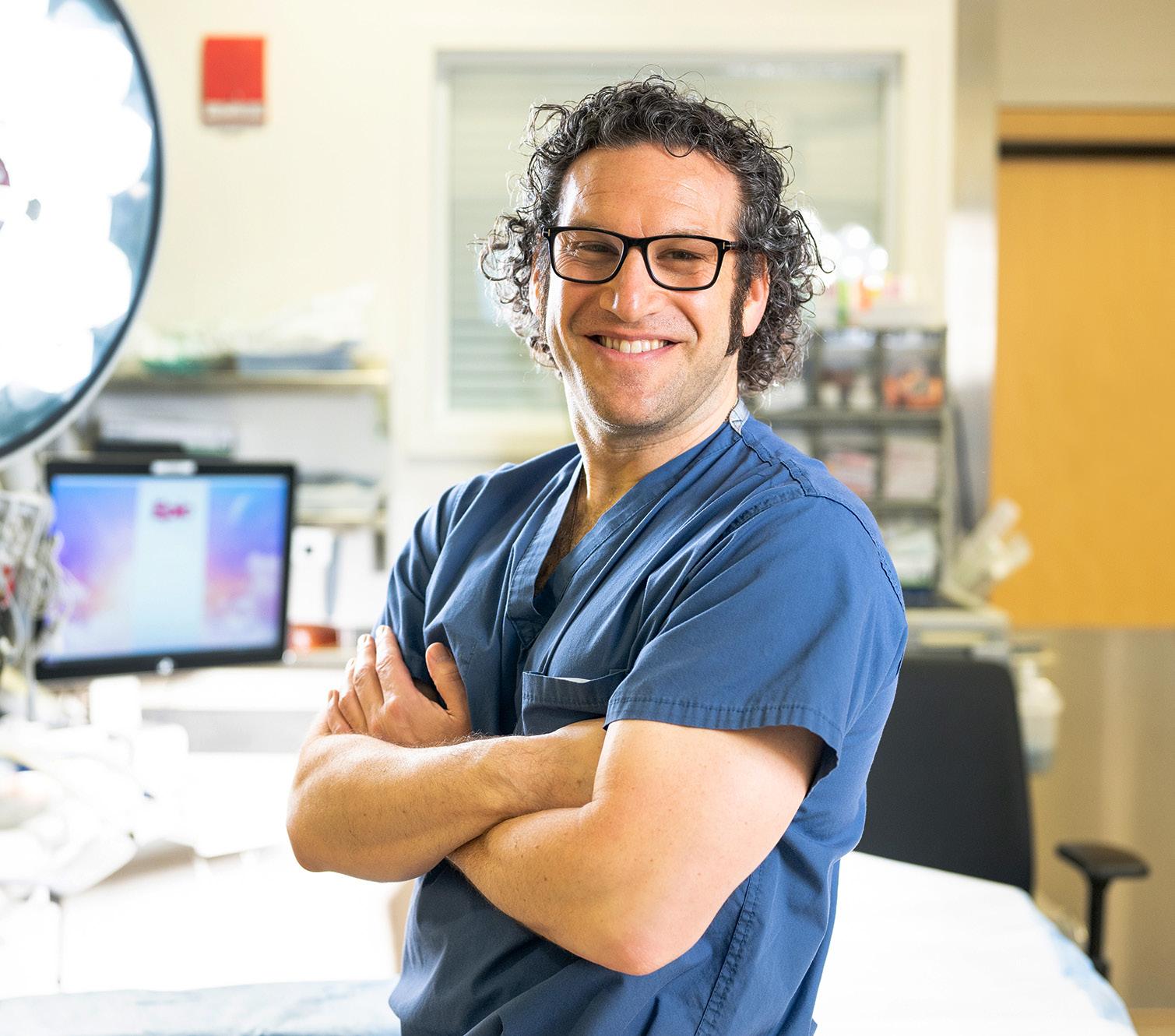

“We want to be on the cutting edge of the science to help preserve joints for our patients.”
Timothy Foster, MD, MBA, MS
“Millions of people live in between—having some arthritis and pain but not yet needing surgery,” Dr. Foster explains. “The idea of preservation is to create a center that can help all those patients who don’t need a hip or knee replacement,” he adds. “We want to help them now, to meet them where they are.”
For patients with joint pain, access to expanded options for state-of-the-art care and treatment holds the promise of a better quality of life and relief from living in discomfort.
On the horizon
Like all fields of medicine, orthopedics has many unanswered questions.
“Your joints are coated with cartilage, and from the day you’re born, you only have three millimeters in most joints. And once you wear through that, you’re down to bare bone,” Dr. Foster explains.
Is there a way to potentially reverse that wear and tear?
On the horizon, ongoing research into stem cells and platelet-rich plasma may yield answers. As Dr. Foster notes, “These are cells that come from your own body that can help to regenerate tissue.” It’s a subject he knows well, having written one of the early sentinel papers on platelet-rich plasma in 2009.
“We want to be on the cutting edge of the science to help preserve joints for our patients,” he says.
“The exciting part is that the science is in its infancy,” he adds. “The goal for the long term is to harness the energy of stem cells and platelet-rich plasma and molecular growth factors inside your body, so that your body has the ability to heal itself, or potentially someday to grow new cartilage.”
“That would change the entire trajectory for the patient,” he reflects.

In response to the growing demand for comprehensive orthopedic care, Newton-Wellesley is pleased to announce plans to create a Center for Bone and Joint Preservation. This highly visible new project will enhance patient experience, advance medical innovation, and strengthen NWH’s role as a leader in orthopedic treatment throughout Mass General Brigham.
In recent years, orthopedic patient visits have risen steadily at NWH, climbing to more than 7,200 in 2024. Since 2020, our patient surgical volume has increased by more than 175 percent, driven by our unparalleled reputation and renowned team. With an aging population that is both thriving and increasingly active, the demand for forwardthinking orthopedic care is higher than ever.
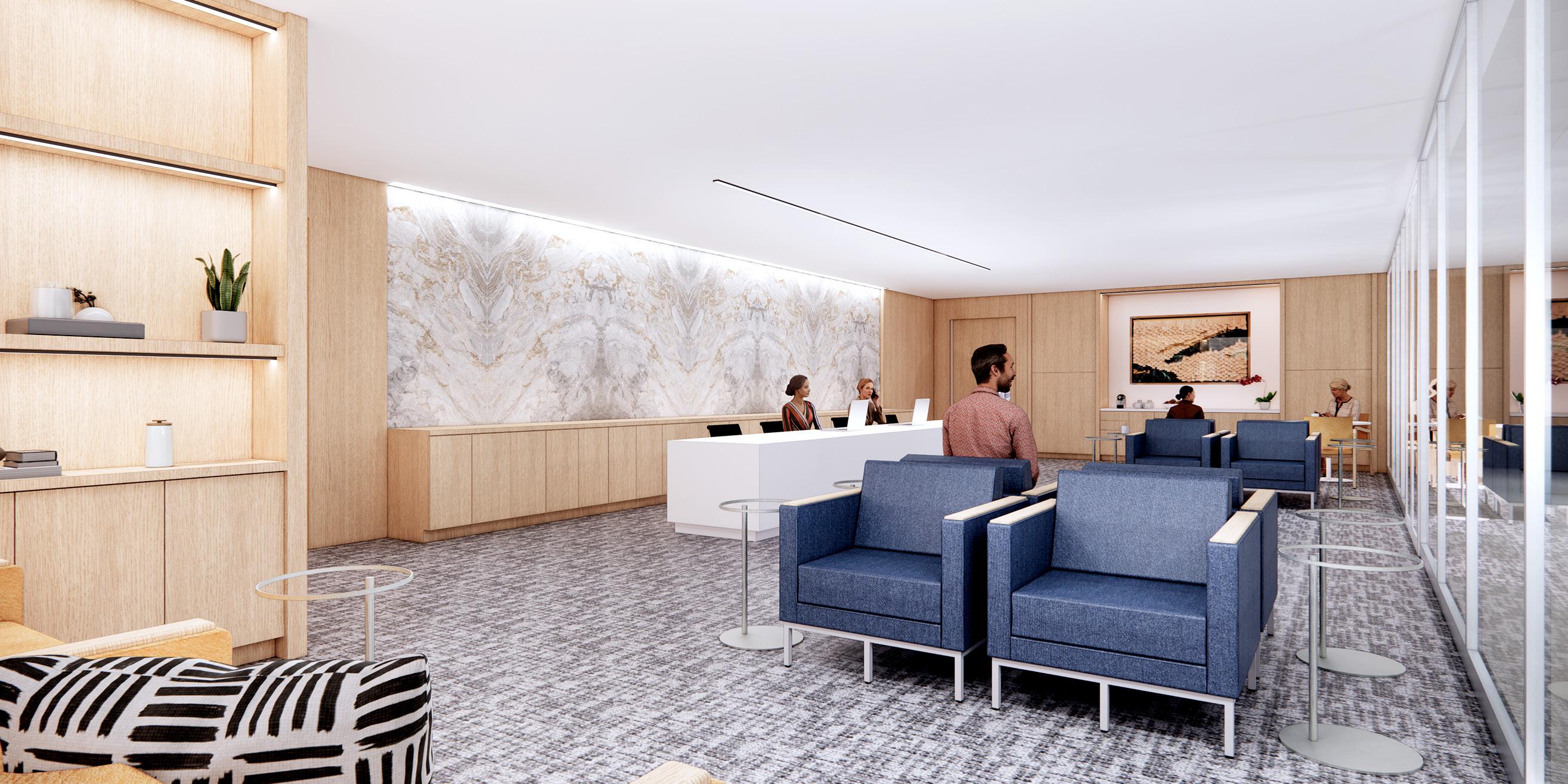

Expanding our impact and reach
The creation of this new Center is not just about increasing our footprint in orthopedics. It’s about enhancing the quality of care we deliver—and the quality of life we promote. With improved facilities and resources, we aim to ensure every patient experiences the highest level of comfort and support while receiving life-changing care to promote bone and joint health.
Our vision: creating a new hub for transformative care
The Center will occupy roughly 7,000 square feet on the hospital’s central corridor, building on the legacy of the Joint Center. Key benefits include:
1
2
3 An open and welcoming location Dedicated diagnostic radiology space Expanded access to innovative therapies


With a powerful new gift, the Sullivan Family has increased their groundbreaking support for palliative care at Newton-Wellesley to more than $3 million.
Steve and Rebecca Sullivan of Wellesley have made a $1.6 million commitment to support palliative care at Newton-Wellesley. Coupled with their earlier groundbreaking gift, this new contribution brings their sponsorship of this vital service to more than $3 million.
The Sullivans’ most recent gift will support the establishment of a palliative care nurse navigator position, a new role that will benefit the entire hospital.
Their gift of $1.5 million in spring 2021 endowed the Sullivan Family Chief of Palliative Care position, currently held by Kosha Thakore, MD, a talented and compassionate physician who leads the NWH Palliative Care team.
“Newton-Wellesley has always had a special place in our hearts.” Steve and Rebecca Sullivan
Palliative care is provided by a team of health care providers, including doctors, nurses, social workers, chaplains, and myriad trained specialists. The team works with other hospital providers to provide comfort and improve quality of life for patients and their families. Offered alongside other treatments, it adds an extra layer of support and relief that complements ongoing care.
The impact of the new role of palliative care nurse navigator will be felt across the hospital, particularly in our Emergency Department. It will significantly enhance our ability to provide efficient, high-quality care for some
of our most seriously ill patients. Research shows that an ED-embedded Palliative Care Consult Program can improve the quality of care for patients and families, streamline patient flow, and provide vital support to our care teams.
Deeply
“We are deeply grateful to the Sullivans for their commitment and compassion,” says Ellen Moloney, president and chief operating officer of NWH. “Palliative care is essential to providing patients and families with comprehensive care and the Sullivans have enabled us to embrace this important aspect of patient and family support. The nature of their gifts also ensures that our service will remain for years to come.”
The Sullivans have been committed to NWH for many years. Steve served on the NWH Board of Trustees for nine years in addition to serving as co-chair of the Palliative Care Council. As the Sullivans became more engaged through events and volunteering, their appreciation for NWH grew.
Wishing to make NWH a focus of their generosity, they became early champions of community support for a budding program in Palliative Care. “As we learned more about the many benefits of palliative care, we sensed that expanding it could benefit so many families in our community,” says Rebecca, reflecting in part on the end-of-life care she experienced with her own mother.
“Looking ahead, we are excited to think about the impact this role can have on enhancing quality of care that Newton-Wellesley can provide to patients and their families during critical times,” she says.
As more young kids struggle with mental health issues, our Child and Adolescent Psychiatry team is actively responding with an expanded array of services.
Elizabeth Booma, MD


“We know that intervening early with kids can be so helpful. How can we reach families at younger and younger ages to give them support, guidance, and education?” Jennifer DelRey, PhD
In 2023, then U.S. Surgeon General Vivek Murthy, MD, described youth mental health needs as “the defining public health crisis of our time.”
In spite of perceptions, it’s not just teenagers. Over the last five years, “we’re seeing everything shift younger,” notes Elizabeth Booma, MD, the Michael S. Jellinek Chief of Child and Adolescent Psychiatry. “We were already seeing that trend in the years leading up to the pandemic,” she adds.
As the only community hospital in our region with a dedicated child and adolescent psychiatry team providing services in the emergency department, outpatient setting, and community, Newton-Wellesley is rising to the challenge.
Over the past decade, consult and clinic visits have nearly tripled. Today, our multidisciplinary team serves 6,000 patients a year, and annually both the number and acuity of cases keep rising. Community- and school-based services reach thousands more.
Aided by philanthropy, NWH has expanded its array of programs to address the unique needs of younger children and their families, including its support of local schools. As one small example of their efforts, Dr. Booma shares that she’s getting ready to speak on the subject to parents and teachers of preschoolers in Natick. Whenever she presents, she drives home a key message: psychiatric illness is common and treatable. Never worry alone. We’re here to help.
Jennifer DelRey, PhD, echoes Dr. Booma’s point. From her experiences on the frontlines of care in both the clinic and community, “we’re definitely seeing families of younger children seeking mental health services and supports more so now than we had in the past,” she observes.
As the director and associate director of The Resilience Project, Dr. Booma and Dr. DelRey work hand in hand.
An innovative school and community-based initiative of NWH’s Division of Child and Adolescent Psychiatry, the project promotes the emotional health and wellbeing of children, teens, and those who support them.
Importantly, “we know that intervening early with kids can be so helpful,” Dr. DelRey adds. Moreover, education and prevention at an early age can be vital—and may keep children from needing treatment.
“How can we reach families at younger and younger ages to give them support, guidance, and education?” Given the evolving needs, that’s become a more pressing question for the team, she adds.
Providing the right help and support to a family and young child can have an impact throughout the entire course of a child’s development. “When we support the adults in kids’ lives, we know it also helps kids,” Dr. DelRey notes.
Beyond the benefits of reaching kids at younger ages, “reaching the parents of younger children is incredibly important, too,” says Susan Maxwell, LICSW, the team’s lead social worker and director of therapy. “Giving them skills of how to approach things like anxiety in children can be incredibly helpful.”
50% of all lifetime mental illnesses begin by age 14
Age 6 is the median age of onset of anxiety disorders in children
Susan Maxwell, LICSW

“This was incredible and touched on so many issues that we experience daily.” “Raising Resilient Kids” parent participant
For many years, NWH has offered a “Raising Resilient Teens” workshop, open to parents across the community. Now in its third year, a parallel workshop on “Raising Resilient Kids” offers invaluable support for parents of children ages 5-12.
Susan co-leads the seven-week workshop with Dr. Booma, offered twice a year in fall and spring. Topics include child development, emotional regulation, challenging behaviors, and positive connections.
Parent surveys describe in participants’ own words how much the workshop has meant to them: “This was incredible and touched on so many issues that we experience daily,” says one. “Really wonderful to have a space where we can learn how to better do this parenting job that no one preps/trains you for.” “Rich content, very relatable, and delivered by incredibly supportive and knowledgeable providers.”
Along with parenting skills, Susan hopes they take away an understanding of how treatable most mental health
issues are, especially with kids. It’s a message that she’s passionate about spreading.
Especially as children approach adolescence, parents may begin to feel that friends have a greater influence. “One lesson for parents is how incredibly important and influential they are,” Susan reflects. “And they can learn ways of responding to kids that can be more helpful. Perhaps more helpful than the automatic responses that parents may have from their own upbringing.”
In the end, “it’s giving people hope,” she concludes. Working together with Dr. Booma, she strives to instill hope that difficult things can be talked about and worked on.
In the outpatient clinic as well, “our parent guidance program is growing so much,” explains Dr. Booma.
This year the team introduced a new approach, deciding to make parent guidance universal. Now, every new
“When a child has a challenge, the whole family is going through it.”
Tai Katzenstein, PhD
family who comes into the clinic sees someone from the team. In doing so, “we underscore right from the start that we’re there to support both parents and kids,” she says.
Tai Katzenstein, PhD, directs the program. She joined the team in 2017 with the goal of helping to build out parent programming.
For her, the Surgeon General’s description of a “crisis” in youth mental health is spot on. Since the pandemic, she feels the needs have only intensified, including among younger children. “When a child has a challenge, the whole family is going through it,” she reflects.
At Newton-Wellesley, “we have a family focus,” she adds. “Being able to support parents is incredibly important. It’s an essential piece of successful treatment, which doesn’t always happen in other settings.”
Dr. Katzenstein brings to her work a profound respect for parents. “I think they are amazing,” she says. Raising a child “is beautiful and at the same time grueling and harrowing.” Parenting is hard enough as it is; layer on top of that psychological challenges, and it can be even more difficult.
Whatever families face, she encourages them that things can get better—for them and their child.
Providing them with the right help and support improves children’s outcomes. At the same time, “parents feel their own sense of efficacy,” she reflects. “They’re also frankly able to feel less alone in their struggles,” she adds.
Supporting schools and pediatricians
As the needs of the community continue to evolve, the Resilience Project brings to life a vision of building relationships and connections beyond the walls of the hospital. Partnerships with local public schools have been a cornerstone of those efforts.
In reflecting on the rise in mental health concerns among younger kids, Dr. Booma and Dr. DelRey point to this year’s expansion of school services into elementary and preschools as an important new resource.

What initially began with a focus on high schools expanded to middle schools, thanks to philanthropic support of the Manton Foundation. A successful pilot in elementary schools last year set the stage for the new initiative. (See related story, page 15.)
“The way we’ve been able to connect with people and to really listen to what the community needs and be able to respond to that has been such a gift,” Dr. DelRey notes.
When it comes to supporting younger patients, the team also works with pediatricians across the community. “That’s always an ongoing collaboration,” Dr. Booma notes. “With any kind of question that comes up, we try to help them in any way we can.”
“We really care about the community. We really care about connecting to families and children.”
Susan Maxwell, LICSW
Across the team, engaging every day with children and families energizes them.
“We really care about the community,” Susan Maxwell reflects. “We really care about connecting to families and children. We’re constantly learning from them about what they need, and we’re always trying to do more.”
What makes the NWH team so special? “I could go on and on,” says Dr. Katzenstein. Families go on and on in their praise: “extremely empathetic and caring,” “very respectful, responsive, and understanding,” “experienced and professional,” and “the most knowledgeable, compassionate, thoughtful, kind, intelligent therapists.”
“And we all believe in the work that we’re doing,” adds Dr. DelRey. “I’m often in a position where families are allowing me to walk with them during what is probably one of the most difficult or challenging times of their life, and I’m always so inspired by them.”
Together with her colleagues, she shares a hope that the team’s efforts lead to a future for kids where we can focus not only on the treatment of illness but also on the promotion of well-being.
When Dr. Booma thinks about what it means to kids, she gets emotional. “It gives me a lot of hope when I see families who are really struggling, and we’re able to work with them and then see a child who’s really thriving,” she says.
Especially for young children, she knows, early care can mean a brighter future.

For more information or to register for one of our programs visit: www.nwh.org/psychiatry/ child-and-adolescent-psychiatry/ our-programs-and-services

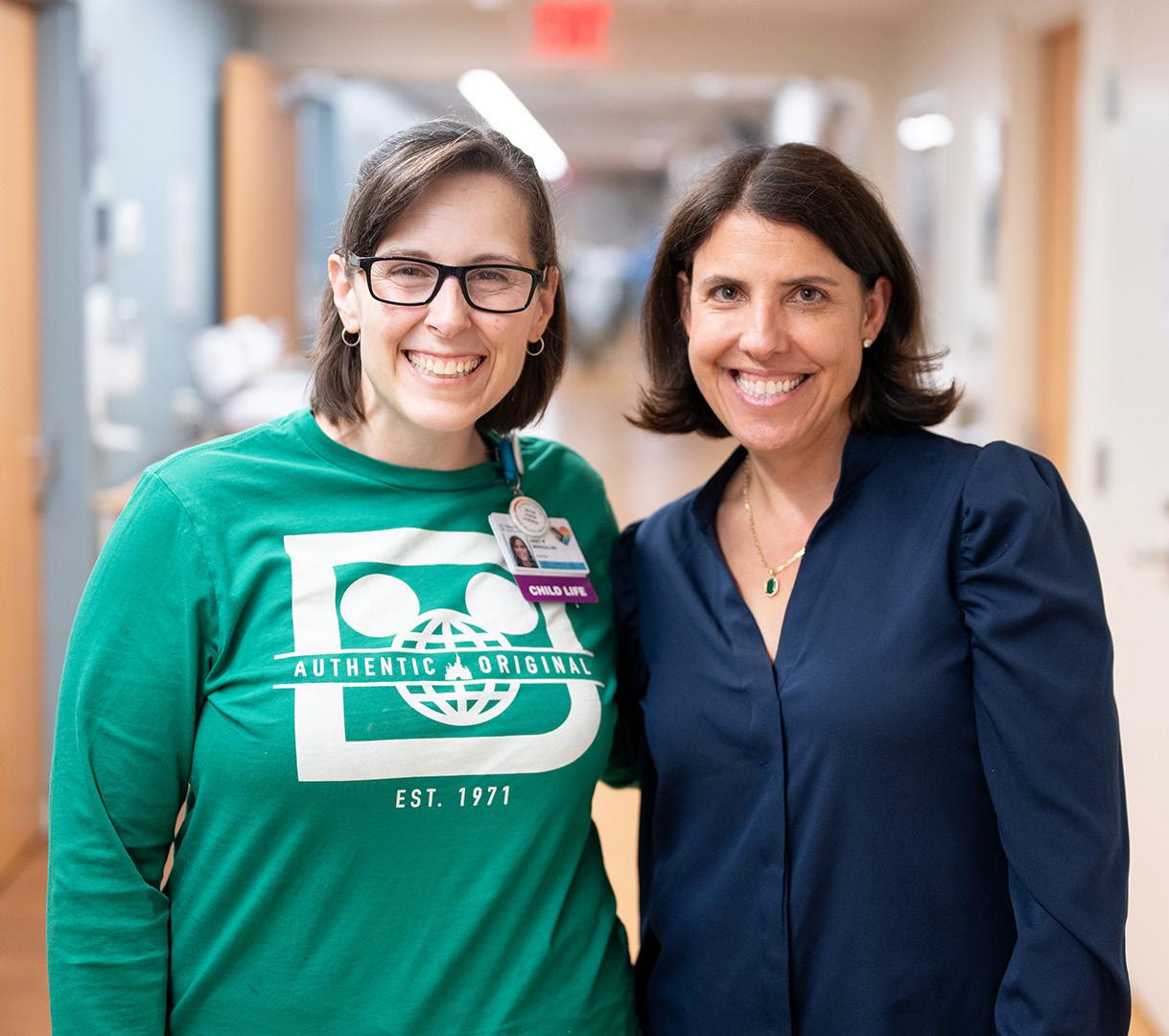

Throughout the 2024–25 academic year, a significant new expansion of The Resilience Project’s school-based programs has paralleled the growing focus on the needs of younger children by NWH’s Child and Adolescent Psychiatry team.
After a yearlong pilot for earlier grades, “this year we started our full expansion of our services into public elementary schools and preschools,” explains Jennifer DelRey, PhD.
The effort builds on an NWH initiative that began with public high schools and grew to embrace local middle schools. Thanks to the generosity of the Manton Foundation, it offers free professional development and clinical consultation from NWH’s world-class, multidisciplinary team.
School-based support focuses on the six towns in our hospital’s primary catchment area: Natick, Needham, Newton, Waltham, Wellesley, and Weston. With the most recent expansion, 64 public schools across those communities can now access these free services.
For both educators and parents, sometimes it can be difficult to know what is typical and a natural part of children’s growth and development.
Along with addressing typical child development, the team touches on how schools can identify children at earlier ages who may need some mental health support.
As part of professional development for staff, they also discuss proactive ways of helping kids learn how to manage their emotions and communicate with others.
The team offers presentations for the parent community in the school as well. “So often that can really help families during a time when there’s so much developmental change happening and kids are growing so fast,” Dr. DelRey notes.
Summit
As yet another facet of The Resilience Project, its Educational Summit has provided hundreds of school personnel and community partners with an annual opportunity for professional development. Attendees
learn from leading experts in the field and collaborate with colleagues about specific school innovations, best practices, and future directions.
This spring marked its ninth year and featured a keynote on “Addressing Loneliness and Strengthening School Connections” by Jerome Adams, MD, MPH, FASA, former U.S. Surgeon General and now executive director of the Center for Community Health Enhancement and Learning at Purdue University.
Welcomed into school communities
The ongoing focus of serving schools grows out of an understanding that they play a leading role in every child’s emotional, social, behavioral, and cognitive development.
“Our schools and our families have really welcomed us into their community, and we are so grateful for that,” Dr. DelRey reflects. “And the relationships that we’ve gotten to build with people over time have been the foundation of our success.”
34,710 students served
Our reach spans 6 school districts and 64 pre-, elementary, middle and high schools

Hospital visits can be especially challenging for kids. If they feel afraid or anxious, our Child Life specialists have “a magic touch.” Whether kids need blood drawn or a CAT scan or surgery, they inform, comfort, and reassure. “We’ll sit with you and your child and figure out how best to get through it,” explains Camilla Sutter, CCLS, the team’s coordinator. If a child needs to get their mind off of it, “we’re great at fun distractions,” she adds.
They’ll often greet kids, toys in hand, to provide some normalcy to an unfamiliar environment. Through play-based techniques, they help kids learn what to expect and how to cope with difficult feelings. Knowing the ripple effects of a child’s illness, they also provide psychosocial support to families.
You’ll find the team from our Pediatric ED to the inpatient Pediatrics unit to the pre-surgery area. Working with patients up to age 21, they’re in constant communication with our wider team of providers to deliver family-centered care.

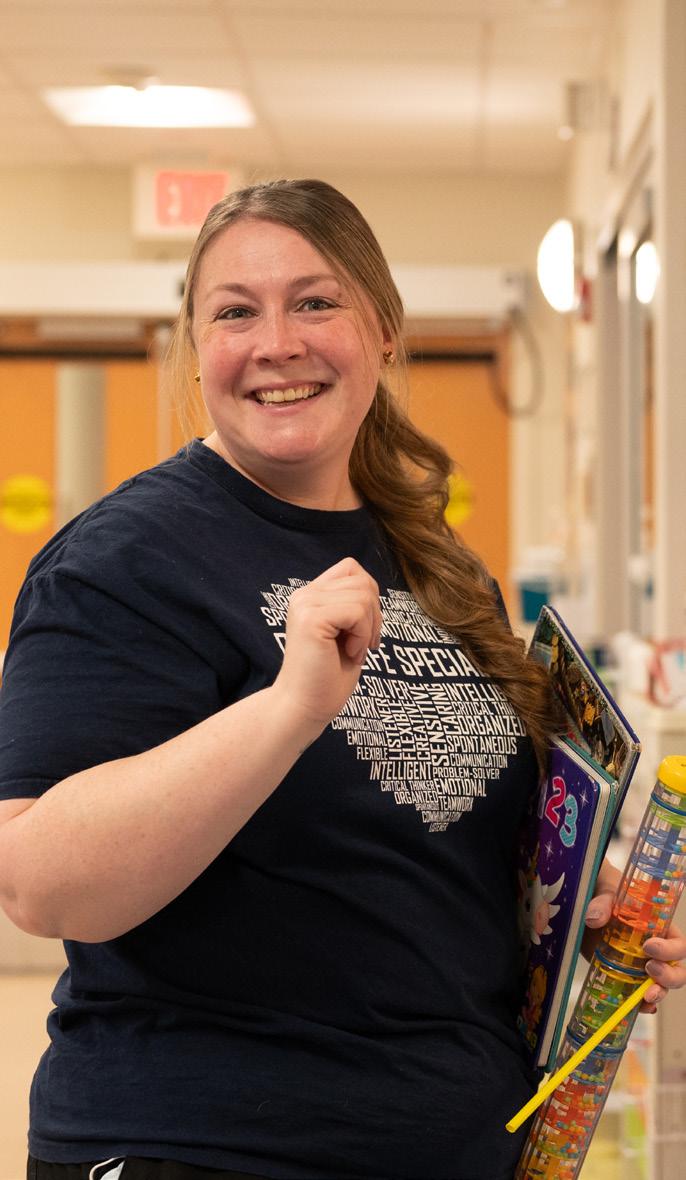



“We’ll sit with you and your child and figure out how best to get through it . . .we’re great at fun distractions.”
Camilla Sutter, MA, CCLS


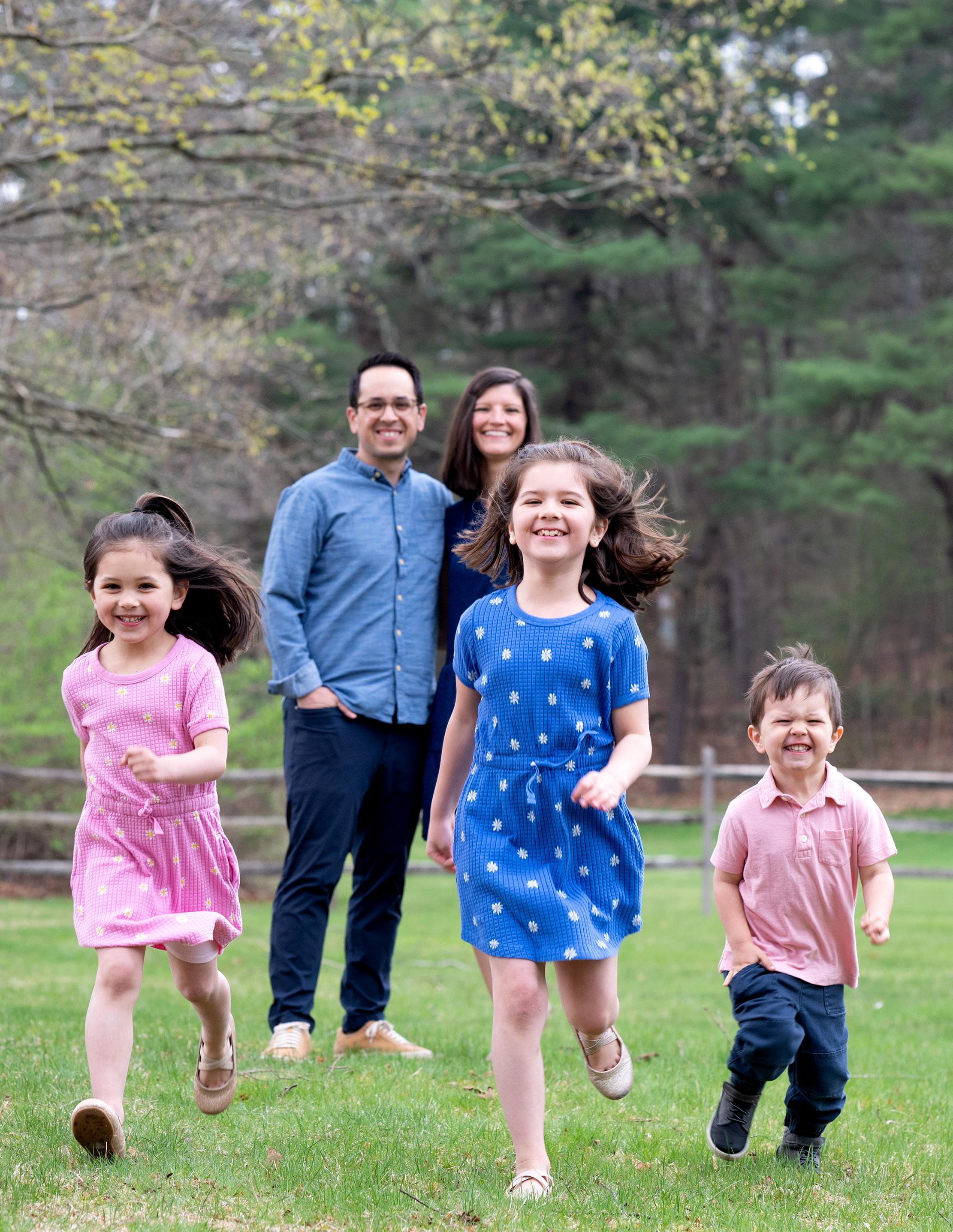
In running the Boston Marathon, Team NWH’s Fred DiStefano gives back for all the hospital means to his family.
Growing up in Massachusetts, Fred DiStefano had always dreamt of running the Boston Marathon. This April, he realized his dream, gratefully running as part of our 2025 Team NWH.
“Without a doubt, the most memorable moment was reaching Mile 17,” he recounts. There at Newton-Wellesley, his wife, kids, and parents erupted in cheers, “right in front of the hospital that inspired this entire journey.”
The incredible emotional boost carried him over Heartbreak Hill and on to the finish line in Boston.
Roots of his gratitude
His gratitude has deep roots. In his early twenties, he spent two frustrating years battling a spinal injury and searching for treatment. An orthopedic surgeon at Newton-Wellesley “really gave me my life back,” he recounts.
His recovery inspired a passion for running that has stayed with him ever since.
NWH has gone on to play a part in many milestone moments for his family. He and his wife, Courtney, celebrated the births of all three of their children here. “The whole experience was all we could’ve asked for and more,” he adds.
Moreover, when one of their daughters needed to be hospitalized at just three weeks old, “her care gave us comfort and hope,” he says. “For us as a family, in both joyful and challenging times, Newton-Wellesley has gone above and beyond to meet every need.”
Deepening connections
When Courtney joined the NWH staff as a Child Life specialist a few years ago, her new role only deepened the family’s ties. To honor her and her amazing colleagues, Fred dedicated his marathon fundraising efforts in support of the Child Life team.
Besides being grateful to NWH, he’s grateful for the generosity of the many people who donated to his cause. In inviting support, “it’s been an easy story to tell because it’s so personal to me,” he says. “This is a way for me to give back and support something that’s so important to us and to the health and wellbeing of our community.”
Making every mile worth it
Throughout months of training, the ability to set an example for their kids kept him grounded and focused. The lesson? “We do hard things not for recognition, but because it builds resilience and character,” he reflects.
“They may not grasp all of that now,” Fred realizes. “But when my 7-year-old told me I had to run it again with her someday, I knew something had clicked. That moment alone made every mile worth it.”
“For us as a family, NewtonWellesley has gone above and beyond to meet every need.”
Fred DiStefano, Team NWH 2025

Our champions
Congratulations to the 11 dedicated members of Team NWH who ran the 2025 Boston Marathon on behalf of the hospital. Together, they raised more than $144,000 to support expert, compassionate care.
Fred DiStefano
Kristin Doherty
Syed Gilani
Ilana Jaye Koppel
George Ross Malik, MD
Sandy Muse, DNP-BC, FNP-BC
Nicole Roche, RN
Eric Shaff
Marshall Sloane
Chris Von Seggern
Sadie Winton

Especially for breast cancer patients, the introduction of a new imaging instrument at Newton-Wellesley has had an immediate impact. “It’s a truly a game changer,” explains Michael Misialek, MD, the hospital’s chair of Pathology. The technology now gives senior pathology assistant Luis Velasquez the tools at his fingertips to examine tissue samples in real time as surgery is going on. As he demonstrates its use, he reflects on the purpose he finds in his daily work, knowing what quicker, higher quality results mean for patients. As Dr. Misialek reflects, it’s one more way that NWH matches the level of care at academic medical centers. “Pathology touches everyone, even if they may not see it,” he says. Noting how fundraising made this breakthrough possible, “it’s a win-win for everyone,” he adds.

The Nurse Residency Program at Newton-Wellesley has recently been accredited with distinction through the American Nurse Credentialing Center Practice Transition Accreditation Program®. This recognition places our program among an elite group of transition-to-practice programs honored nationally and globally.
Sharon Keogh, MSN, RN, NPD-BC, PCCN, has guided the program from its start in 2022. When she thinks about what the nurse residents bring to NWH and the profession, “they are our future,” she says.
The distinction underscores our commitment to excellence in nursing practice, education, and patient care— all philanthropic priorities. Thanks to the many donors who support our phenomenal nurses.

Newton-Wellesley celebrated all that Buddy, our beloved facility dog, has meant to patients and staff alike at his retirement party in April. Since joining the staff in 2022 with generous support from our donors, he’d been a gift to the hospital community. “You fall in love with him the minute you see him,” noted WBZ news anchor Lisa Hughes in wishing him a happy retirement on air. While a neurological condition has forced Buddy to retire early from the job he loved, he’s left an impact on countless lives.
At this fall’s 25th annual Gala, Newton-Wellesley has every reason to celebrate as we commemorate a quarter century of philanthropic impact on our hospital and community. Join us for a night to remember on Thursday, October 30, 2025, at the Westin Waltham Boston, 70 Third Avenue, Waltham.
The evening’s beneficiary will again be the Community Collaborative, a cornerstone of our unique community-based approach to addressing the most compelling health needs of our neighbors. Nearly 200 members strong, the Collaborative’s eight councils strive to lessen healthcare disparities and strengthen the social fabric of support.
Connections will be the perfect theme for an unforgettable evening of giving, storytelling, and celebration, 25 years in the making.
To learn more about the many philanthropic opportunities, visit: www.one.bidpal.net/25nwhgala/welcome
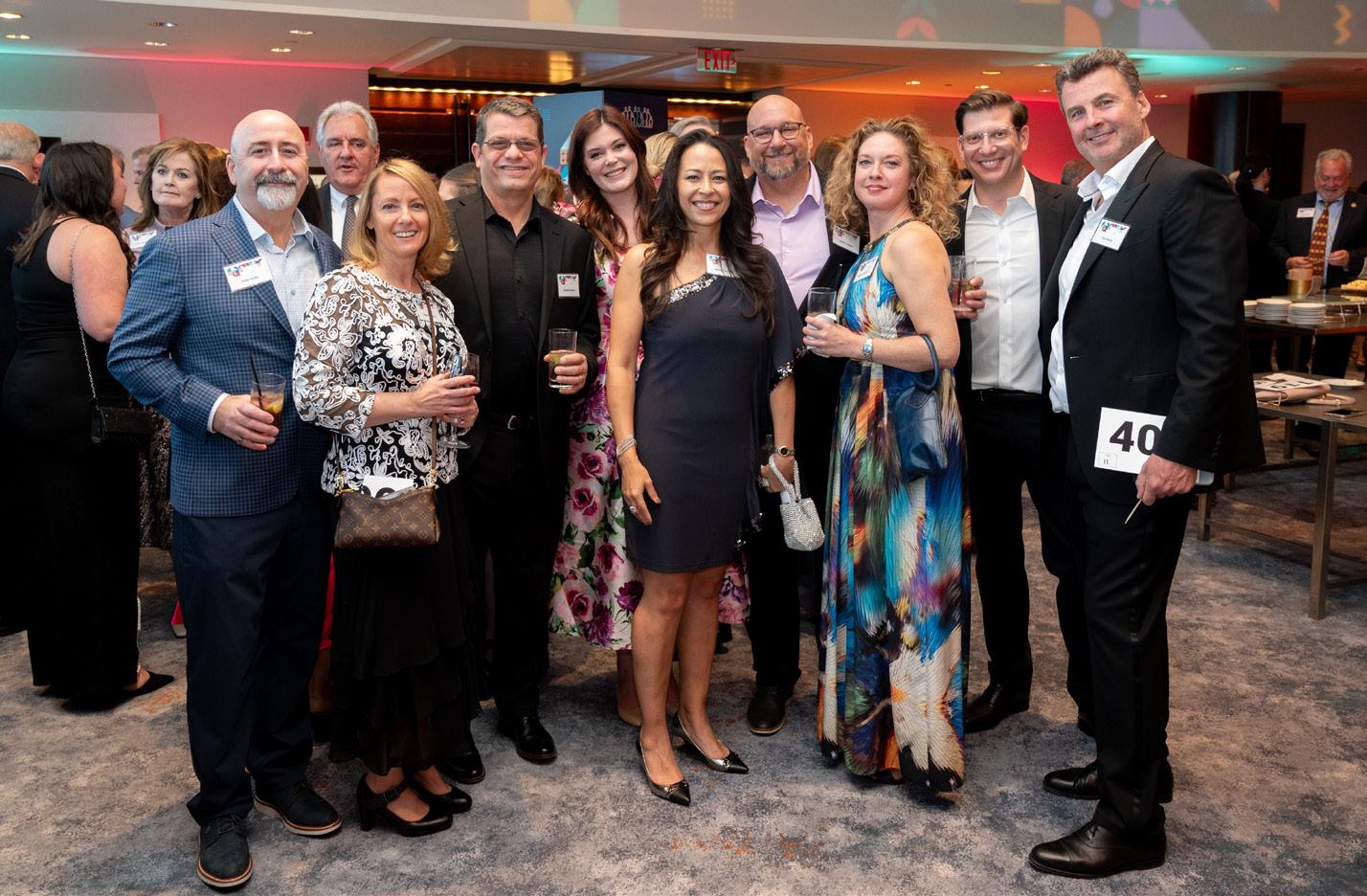
1,000+
community members trained in lifesaving Narcan use through the Substance Use Services Council. An innovative new pilot, initiated by local teens, aims to provide this training to fellow students as well as teachers and parents.

Every day, members of the community turn to NewtonWellesley Hospital for hope. Whether it be for cardiovascular care, cancer treatment, or orthopedic surgery—the team at NWH is here for you.
Our physicians, nurses, and staff work tirelessly to provide the most compassionate and expert-level care right here in the community. Their dedication and commitment are unwavering. Your support will have a direct impact on their work and is vital to the success of all that we do. Together, we can change lives.
With a gift of $1,881 or more, you’ll be welcomed into the 1881 Pillar Society, honoring the true “pillars” of our community and the year of NWH’s founding.
To give now, visit: giving.nwh.org

Sponsor the NWH Golf Tournament today!
Join us for a day to remember on the links this fall, and contribute to a healthier future for our community and its youth.
Foursomes and sponsorships are now available for the annual NWH Golf Tournament on Monday, September 8, 2025, at Wellesley Country Club. By participating, you’ll be directly benefiting our Community Collaborative’s Workforce Development Council, including its annual youth summer internships.
To register or learn more, visit the tournament webpage: www.one.bidpal.net/25nwhgolf/welcome


As one donor couple reflects, legacy giving offers a way “to leave the world a better place.” It’s never too early to plan for the future.
By including Newton-Wellesley in your estate plans, you’ll create a legacy of giving and help preserve one of the institutions that you care about most. In doing so, you’ll be welcomed into our Eliza P. Kendall Society, celebrating your vision and generosity.
To explore your options, visit giftplanning.nwh.org or contact Susan Salcetti, Director, Gift Planning, at nwhdev@partners.org.
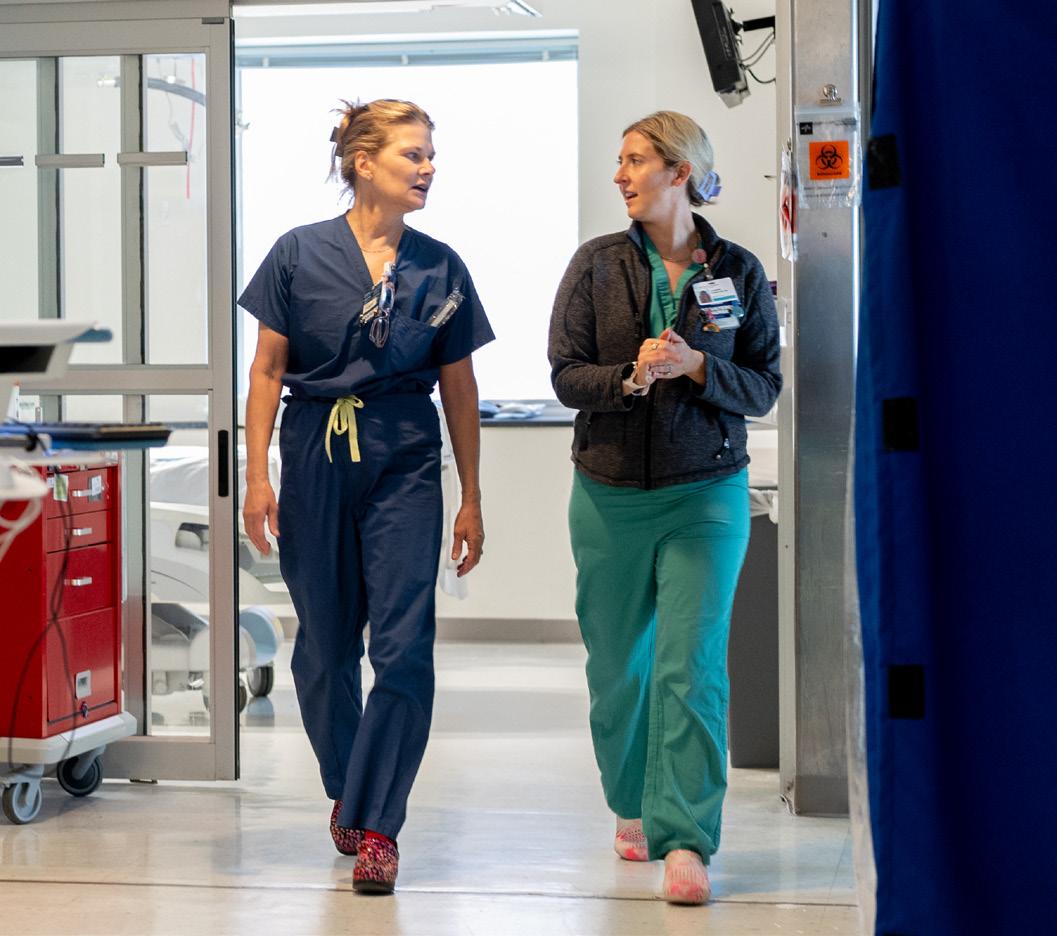

“We’re on the cusp of a very, very special time.”
Benjamin Gomez, member, NWH Board of Trustees and Mass General Brigham Board of Directors
For Benjamin Gomez, Newton-Wellesley’s values have always resonated. He describes them simply: “just treat people well.”
In all his family’s interactions, the longtime trustee sees NWH living out those values, building goodwill and engendering trust. “I deeply admire that,” he says.
He and his wife, Susan Cable, often hear from friends how wonderfully they feel treated, he smiles to add.
His roles as both a trustee of Newton-Wellesley and a member of the Board of Directors of Mass General Brigham provide him with a unique perspective on NWH’s essential place within the community and system.
Guided by community values
To every role, Ben brings vast experience from the worlds of business and community investment. He has served for more than two decades as managing director of Pilot House Associates, a family investment office in Boston.
Along with serving as a director of several private companies, he also contributes his expertise to the boards and investment committees of leading nonprofits. “Always a believer in the ability to listen well,” he appreciates how readily his fellow trustees approach solving problems collaboratively.
At NWH, “people are at the top of their game.” He sees its leadership as deftly balancing community needs with the economic realities for long-term sustainability.
The future of healthcare “Healthcare is a critical part of everybody’s life,” Ben reflects. “Yet for a lot of people throughout this country, it can be difficult and fraught.”
Looking across Mass General Brigham to the future, he’s reassured to know how many great minds are focused on improving care and access. He sees this as the path to being great today and even better tomorrow.
While he sees Newton-Wellesley as poised to emerge stronger, “the economics of being a hospital have never been under more duress,” he explains. On the frontline, “providers are all going above and beyond.”
In his mind, “there’s going to have to be a reinvention of how we provide medical care,” he says. As challenging as it will be, “I’m happy to be involved with institutions at the forefront of figuring out the best possible way to execute on that change.”
Philanthropy as a driving force
“We’re on the cusp of a very, very special time now,” he believes.
To Ben, philanthropy will be critical in shaping the future. “I think it’s going to be the make-or-break thing that allows us to execute on change,” he reflects.
Walk around the campuses of Newton-Wellesley or any of the storied institutions of Mass General Brigham, and “you’ll see the impact of capital projects past and present—and how much philanthropy drives that.”
“I think our community deserves world-class facilities, and philanthropy is going to be the key to unlocking that,” he adds. As a community, “we’re all blessed to have Newton-Wellesley, and we have a responsibility to invest in this treasure.”
He ends with a story of a transformative experience from early in his tenure as a trustee.
Serving on a review committee for one of NWH’s most distinguished chairs, Dr. Lawrence Friedman, he heard glowing reports from physician after physician. In listening to what he meant to them and to the institution, “I realized what a special person and a special place this is.”
“It cemented my genuine admiration and respect,” Ben says. “My love for this place has only grown.”

“With each step you take toward a healthier lifestyle, you’re truly paving the path to wellness.”
Amy Comander, MD, Director, Breast Oncology and Cancer Survivorship, NWH, and Director, Lifestyle Medicine Program, Mass General Cancer Center
How can I live my best life? That question often propels breast cancer survivors to seek support from the PAVING a Path to Wellness program, explains Amy Comander, MD. In the five years since she met with its very first group at NWH, more than 320 patients have taken part. Together, they’ve explored the power of exercise, diet, sleep, stress management, and personal connections. As interest has multiplied, so has the team. “We now have a multidisciplinary team of wonderful leaders,” she emphasizes. In a world with so much misinformation, they provide evidence-based ways to be the healthiest version of yourself. She loves how one participant describes it: “a road map for how to live and move forward.”
Learn more at www.massgeneral.org/cancer-center/patient-and-familyresources/supportive-care/paving
Newton-Wellesley Hospital Development Office
2014 Washington Street
Newton, MA 02462
nwh.org/giving



“I had the best nurses—so kind and caring. Top notch, skilled, sympathetic, and always positive. Quick to answer any questions. SO very understanding!”